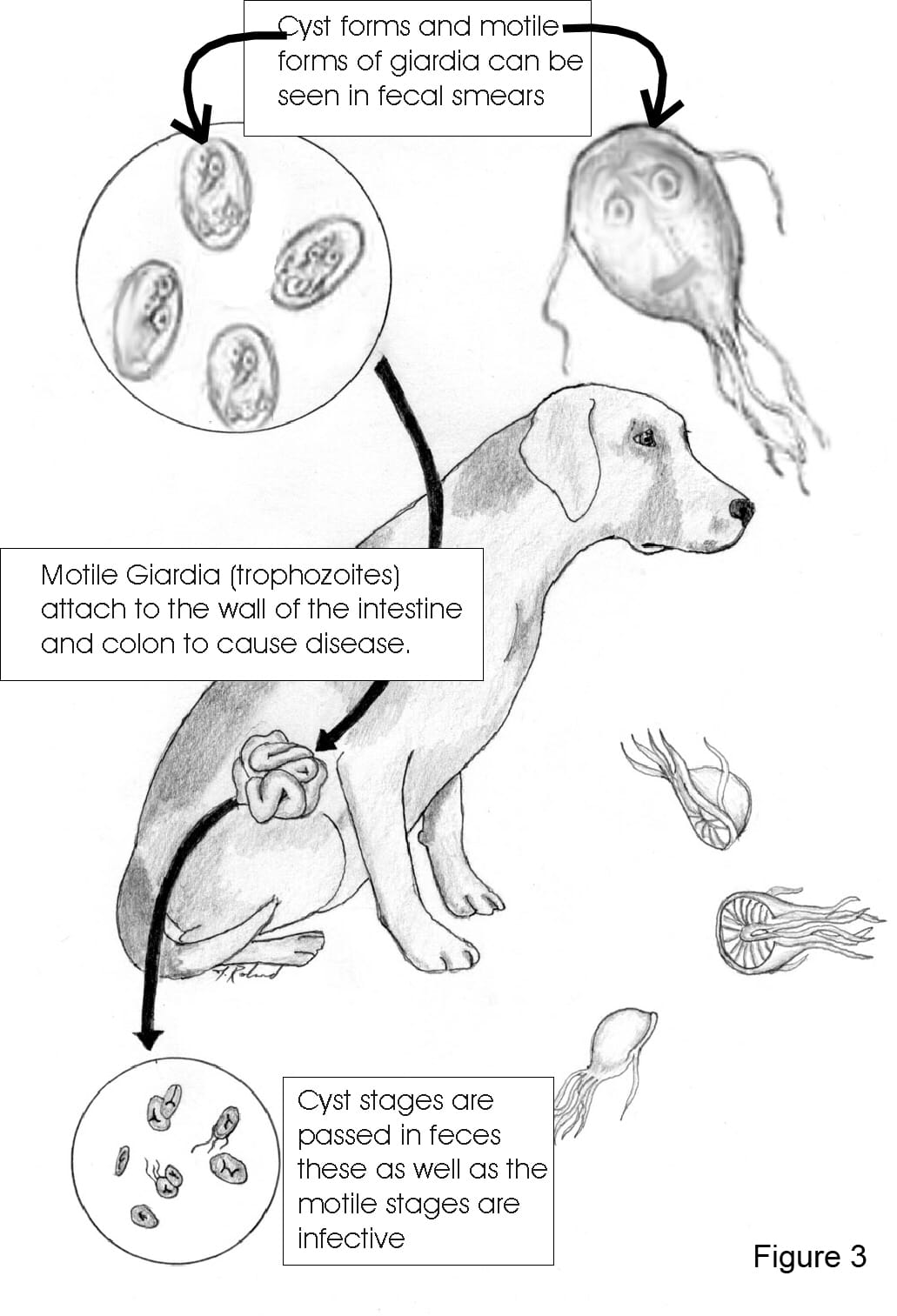Giardiasis is a prevalent parasitic infection that can lead to diarrhea in dogs. This condition is caused by an intestinal parasite known as Giardia, commonly found in soil, food, and water contaminated with feces. While some dogs may exhibit no signs of infection, younger dogs or those with compromised immune systems are more susceptible to developing symptoms. Due to the ease with which dogs can reinfect themselves, successful treatment hinges on effective antiparasitic medications, coupled with meticulous cleaning and environmental management, both indoors and outdoors.
Understanding the Causes of Giardiasis
Dogs contract Giardia by ingesting water, soil, food, or objects contaminated with feces. The parasite exists in two forms: trophozoites, which inhabit the intestines of infected dogs, and cysts, which are trophozoites protected by a hardy outer shell and are shed in the dog’s stool. These cysts are resilient and can persist in the environment for months, posing an immediate infectious risk as even a few ingested cysts can trigger an infection. Dogs can easily become reinfected, for instance, by grooming themselves if cysts remain on their fur, paw pads, or hindquarters.
Recognizing the Clinical Signs
Many infected dogs remain asymptomatic, maintaining normal appetite and energy levels. However, in more severe instances, dogs might display lethargy, a reduced appetite, or weight loss. The most common clinical signs associated with Giardiasis include:
- Sudden onset of diarrhea.
- Stools that are soft or watery, often containing mucus and possessing a foul odor.
- Abdominal discomfort.
Diagnosis and Veterinary Examination
Diagnosing giardiasis typically involves your veterinarian examining a stool sample. Because Giardia cysts are not always shed continuously in the stool, they may not be detected in a single sample. Your veterinarian might conduct a second fecal test, which is unaffected by intermittent cyst shedding, to look for other indicators like Giardia-specific antigens – small proteins produced by the parasite.
Treatment Strategies for Giardiasis
The primary goals of treatment are to resolve diarrhea and alleviate other clinical signs. Dogs that are asymptomatic may not require any treatment.
Medication
Several medications are commonly used to treat Giardia:
- Fenbendazole is a widely used deworming medication.
- Metronidazole, an antibiotic, is another effective treatment option.
- Your veterinarian may also prescribe a combination of both fenbendazole and metronidazole.
Dietary Support
Your veterinarian might recommend a diet specifically formulated to support digestive health, aiding in the resolution of diarrhea.
Bathing and Environmental Cleaning
It is crucial to bathe affected dogs thoroughly on the final day of treatment to remove any residual fecal matter and Giardia cysts from their fur. Effective cleaning methods for killing Giardia cysts include common household disinfectants and steam-cleaning. Prompt removal and disposal of all feces are essential. Giardia cysts on lawns can only be eliminated by direct sunlight that dries them out.
Prognosis and Potential Complications
With appropriate treatment, most dogs make a full recovery from giardiasis. If diarrhea persists after treatment, your veterinarian may need to re-examine a stool sample to determine if reinfection has occurred. Retesting for antigens is generally not recommended, as Giardia antigens can remain detectable even after successful treatment, potentially leading to false-positive results.
Dogs are prone to reinfection if their environment is not adequately managed. Furthermore, refractory infections can occur if the Giardia strain is resistant to the medication used or if the medication was not administered at the correct dosage.
Zoonotic Potential and Contagion
While Giardia can infect humans and other species, the strains that typically infect humans differ from those commonly found in dogs and cats, and vice versa. Consequently, human infection from pet Giardia strains, or pet infection from human strains, is rare. Nevertheless, thorough handwashing with soap and water after handling pets or infected feces is always important.
In multi-pet households, an infected dog generally does not pose a significant risk to a healthy cat due to species-specific vulnerabilities. Similarly, an infected cat is unlikely to infect a healthy dog. However, an infected dog does heighten the risk of exposing other dogs in the household to Giardia due to the presence of cysts. To mitigate this risk, encourage defecation in separate areas, wipe the infected dog’s rear after defecation, and prevent mutual grooming. Continue prompt feces disposal, bathe the infected dog at the end of treatment, and always wash your hands after interaction.

